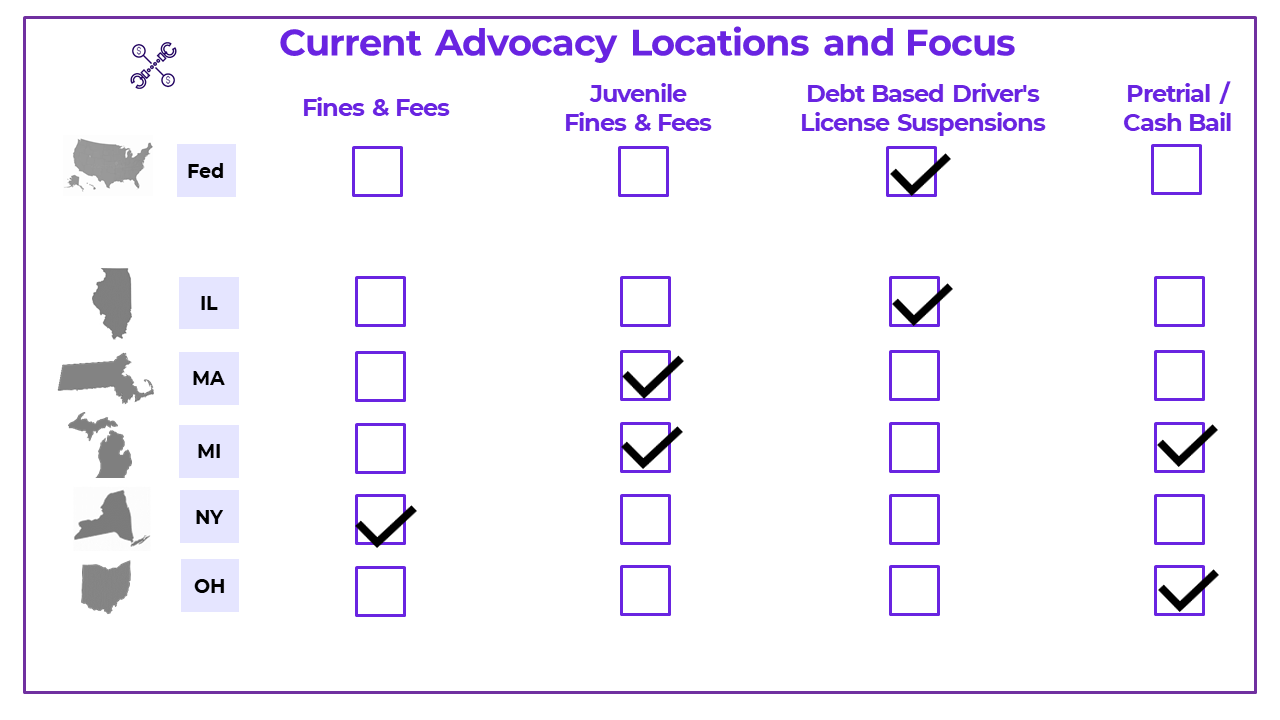CEOARE’s focus on decriminalizing poverty is guided by core principles: The ability to pay fines, fees, or bail should never be the sole reason for incarceration or be the reason an individual suffers additional judicial consequences, and justice system fines and fees should not disproportionately punish the underserved.
We are working to:
1. Eliminate fees and reform justice system fines based on the ability to pay to help reduce the additional burden placed on individuals and families experiencing poverty.
2. Eliminate the practice of debt-based driver’s license suspensions, which can be a harmful and counterproductive method of collecting unpaid fines and fees.
3. Reduce unnecessary pretrial incarceration and racial disparities while prioritizing public safety and pretrial liberty to reduce unnecessary disruption to people’s lives, families, and employment.
Many existing policies can create a two-tier system of justice that disproportionately impacts communities of color. Having means does not equate to innocence and a lack of wealth does not equate to guilt. According to the Federal Reserve, more than one-fourth of adults had one or more bills that they were unable to pay in full that month or were one $400 financial setback away from being unable to pay them [1], which means many Americans would be unable to afford even small amounts of justice system fines, fees, or cash bail. This can be harmful to individuals’ overall well-being and to the economic growth of the business community due to the overwhelming impact of absenteeism, labor shortages, and turnover.
In a just system, legislation should not disproportionately target any demographic. Join us as we pursue change in the following states:

+
- Of the 547,000 Americans sitting in local jails every day, 81% are presumed innocent awaiting trial. [2]
- The median annual income of those unable to afford bail is $15,000. For Black Americans, it is $11,000 for men and $9,000 for women. [3]
- Many people are unable to afford fines and fees, indicated by the national court debt that totals at least $27.6 billion [4]
- 12% of Black families have unpaid legal expenses, fines, or court costs, compared to 5% of white families [5]
- Nearly 11 million Americans have had their licenses suspended for unpaid court or administrative debts.[6]
[1] “Economic Well-Being of U.S. Households in 2020 – May 2021 – Dealing with Unexpected Expenses.” Board of Governors of the Federal Reserve System, May 2021. https://www.federalreserve.gov/publications/2021-economic-well-being-of-us-households-in-2020-dealing-with-unexpected-expenses.htm.
[2] Wendy Sawyer and Peter Wagner, “Mass Incarceration: The Whole Pie 2022,” Prison Policy Initiative, March 14, 2022, https://www.prisonpolicy.org/reports/pie2022.html.
[3] Bernadette Rabuy and Daniel Kopf, “Detaining the Poor: How Money Bail Perpetuates an Endless Cycle of Poverty and Jail Time,” Detaining the Poor: How money bail perpetuates an endless cycle of poverty and jail time | Prison Policy Initiative, May 10, 2016, https://www.prisonpolicy.org/reports/incomejails.html.
[4] Briana Hammons, “Tip of the Iceberg: How Much Criminal Justice Debt Does the U.S. Really Have?,” Fines and Fees Justice Center, September 27, 2021, https://finesandfeesjusticecenter.org/articles/tip-of-the-iceberg-how-much-criminal-justice-debt-does-the-u-s-really-have/.
[5] “Report on the Economic Well-Being of U.S. Households in 2019, Featuring …” Publications, May 2020. https://www.federalreserve.gov/publications/files/2019-report-economic-well-being-us-households-202005.pdf?wpisrc=nl_daily202.
[6] Joni Hirsch, and Priya S. Jones, Driver’s License Suspension for Unpaid Fines and Fees: The Movement for Reform, 54 U. MICH. J. L. REFORM 875 (2021). Available at: https://repository.law.umich.edu/mjlr/vol54/iss4/5





